The mansion is a study in architecture at war with itself. It’s not just the windows that don’t match and the turrets that don’t overlook anything and the roof that sits flat here while looming at impossible angles there. Nor is it just the exterior walls that, seen from one angle, seem rotted and decrepit and about to collapse, and seen from another, gleam like jewels. Nor is it the gnarled skin of the columns that support the overhang at the front entrance, or the glistening scarlet door that seems poised to open until you see that it’s not a real door at all, but just a reasonable facsimile, carved with great love into what would otherwise be just a featureless brick wall.
It’s the way that way none of this stays the same for more than a second or two; the way you can focus on one bay window or one turret or one balcony only to see it shift, retract, and sink beneath the house’s surface like something swallowed by an amoeba, only to emerge, seconds or minutes later, wearing a different shape, a different character, a different purpose in the overall design. It is impossible to face the mansion without knowing that it has always been changing, plank by plank, brick by brick, for as long as it has stood in this damned and isolated place beneath scarlet skies, in a blackened country, far from any roads.
You are impressed. Most normal houses provide no challenge to you. You’re not just an excellent thief; you’re the first thief. You find most locks nothing more than interesting trinkets, most fortresses nothing more than delusions built of mortar and stone. Some have required planning, some have been challenging, but few have stymied you for more than a few minutes. For you, the greatest difficulties involved in conquering any house has been first finding out that the house was there, then determining who and what was inside, and finally making the decision that the time had come to pass through the threshold, to claim those inside. But this house, by its very nature, has no threshold; it has no vestibule; it has no foyer. It has only a spastic geography that alters in hiccups. You are particularly fascinated by the moat; a gaping, watery trench that orbits the house like the blip on a radar screen, constantly excavating itself on one end while filling itself in on the other. The alligators that bob to the surface of that water, hissing and snapping, threatening bloody dismemberment to any wanderer unlucky enough to be standing on the grass when the earth beneath him becomes moat again, are no less threatening for being temporary. It’s a nice effect, determined to unnerve any potential intruders. You can only admire the tenants for their cleverness in managing such a thing, as you wait for the moat to fill in before you, enabling you to approach the house without wetting your feet.
The outer wall is warm. Of course, most inhabited buildings are warm, in a way that has little to do with surface temperature. They glow, in their own special way, with the warmth of the lives within. All houses bear the mark of the births and deaths, the lovemaking and the hate, the complacency and the fear, of those within. It may not be possible to track the entire course of their lives with a touch, but it’s hard not to know that inhabitants exist. But this house is warm in a different way. It feels like it’s boiling. It feels like a sack full of cats, scratching and clawing and tearing pieces from each other in their desperation to be free. You pull your hand away as if burned. You touch the wall again. And this time you endure the heat, lingering on it, giving yourself time to feel the sheer weight of all the pain imprisoned within. There’s unhappiness here: desperate unhappiness. And hopelessness, too. There’s so much that breaking in is going to mean taking a deliberate step into somebody’s personal hell. This won’t deter you, of course. You’ve seen suffering before. But it’s good to know such things, before getting down to work. You nod, and take a step back, and watch the shifting textures of the wall before you as they shift from brick to stucco to stone to unfinished wood. You wait until a single open window, flapping a flyspecked pull-down shade, comes around the corner and moves across the building face before you. The view through that window shows no details, but shifts color and brightness as quickly as a strobe light. It looks like an opening into a blast furnace. It would take insanity or unlimited self-confidence or unconditional devotion to duty to willingly enter such a place. You don’t hesitate. You grab the window as it moves by, hop up onto the sill, and slide into the mansion with an ease that makes you wonder why you ever thought this was going to be difficult.
Your first glimpse of the mansion’s interior turns out to be a parlor. Its own geography doesn’t shift, which you find a relief after the crazy-quilt schizophrenia of the architecture outside. It’s still a nasty place, choked with dust, unlit except for a single shaft of sunlight entering through the same window that just admitted you. The sunlight doesn’t change angle or orientation, despite the window’s ever-changing attitude toward the sun; that by itself is enough to make you look back out that window so you can spot the motionless clouds and gnarled trees and the frozen position of a bird caught in mid-flight and from them make the determination that time inside the mansion has been compressed to fit inside a single captured moment. It’s an impressive trick, which bodes poorly for the number of even more impressive tricks that the tenants might still have waiting for you as you penetrate deeper and deeper into the house. You take it as a welcome indication that you’re now free to take as much time as you require.
Turning from the window, you regard the rest of the shadow-choked room: the bookshelves stuffed with volumes chosen for their bindings instead of their literary value, the fireplace sitting black behind an iron grate, the trophy heads of a rhino and a moose looming over a grand desk. Something—a rat, or perhaps something stranger—scratches in a corner. A pair of carved mahogany doors sit invitingly at the far end of the room, but you don’t head there right away; instead, you move to the desk, which bears a single yellowed sheet of paper so carefully centered that it screams set decoration. The dust covering the desk is so thick that the paper itself is impossible to read at first, but you sweep away the detritus of years and read the words that have been left for you in ink as black as your purpose here: LEAVE US ALONE! It’s the first pathetic thing you’ve seen since your arrival, and it lets you know the tenants are frightened of you. You crumple the paper without a thought and drop it to the floor, wondering just how long it will take the dust to bury the useless warning forever.
A deadbolt seals the double doors, but it’s no challenge. You glide through the opening into a long gray hallway that seems to extend an infinite distance in both directions. The air is obscured with dust and vapor, but you can see that the walls extend at least as far as their vanishing points. There don’t seem to be any other doors or branching corridors as far as you can see. The floor is ceramic tile; the walls are lit by a series of torches sprouting eternal flame; the air echoes with the distant sound of daggers sharpening on whetstones. You stand outside the parlor, glancing first one way and then the other, admiring the impossibility of the choice you’ve just been offered. It’s infinity both ways. You could very easily commit to one direction, or the other, and spend hours or days or years trudging toward an imaginary destination, always wondering whether it was truly up ahead or instead receding further with every step. You could, but you won’t. It’s too easy a trick to fool the likes of you. You know that there’s no life to be found either way, and that in any situation where you’re offered two equally unacceptable options, the only true solution is to make a point of choosing neither.
So you stand still, and listen, focusing past the sound of daggers to the even more distant sound of a young woman crying. It’s not close, but the acoustics of this house have protected the sound, funneled it down the corridor, and delivered it at this spot, where it’s just soft enough to be subliminal. You might have missed it. You could have been forgiven for missing it. But it’s there, and the closer you listen, the more you hear. You can tell that the tears are not new, that they have nothing to do with your presence in this house, but have rather been flowing for almost as long as the house itself has stood; that the woman, though young, has suffered enough to feel ancient; that she knows she is heard and that it won’t make a difference; and, most importantly, most useful to you as a stranger struggling to make his way through this place, that she is swaddled in darkness. Darkness, you decide, is the way to her. Without taking a single step, you look around for a shadow and find one, a short stroll away, hiding between a pair of torches that have gone out. It is not an impenetrable darkness, but it is all the occupants have provided, so it will have to be enough. You make your way there, your bare feet splashing in puddles of stagnant damp. You take your time. You face the spot the light has abdicated. And you step inside.
The voice in the darkness is familiar, and hateful in its familiarity. “When I was seven years old I found a stray cat that had been wounded by some kind of wild animal. It was lying on its side in the road, with one eye gone and its guts opened up like a canvas sack. I could see intestines through the hole in its belly; there were already maggots hard at work at the insides there. I knew from the way that belly moved up and down that it was alive anyway. It didn’t have enough strength to cry, but it was alive, and in pain, and aware of everything that was happening to it. If I knelt close enough to its face I could make it see me through its one good eye: the one the animal that wounded it hadn’t gotten to. The other eye was flush against the ground, half in and half out of the cat’s juice: it was just an empty glass ball, like most cat eyes, not remotely expressive to speak of, but it was still enough of a window to look in and see what the beast was thinking, whether it wanted to live in agony or preferred instead to die in one sudden burst of pain by being hammered with the largest rock I could find. I saw something that wanted neither: that was as frightened of ending as it was of continuing. It hated me for being there. It hated me, thinking I was you.”
That seems to be the end of the story, for now.
You emerge from another shadow in a bedroom choked with pink tapestries. They hang limp as shrouds from a ceiling crisscrossed with spider webs, their erstwhile cloying brightness reduced by dust and age to a shade reminiscent of the flesh beneath peeled skin. The air smells like perfume, disease, and fear; there are scavengers too, which shriek and scurry for their hidden bolt holes as soon as you, the enemy, move into the sickly gloom that the inhabitants of this place are willing to accept as light. One of them, a rat so drawn and skeletal that he might have been long dead anywhere else, shows more courage than his fellows. He doesn’t flee from you, but charges, his long sharp teeth gleaming. You lift up one foot and stomp him flat even as he imagines himself about to enjoy meat stolen from your leg. The blow is flawless in its brutality. You come down with all your weight, breaking his spine, crushing his ribcage, making juice of all that sits inside. His last breath escapes in a pink mist. You step away, feeling no particular satisfaction and no particular pleasure, thinking only that you just removed the most minor of obstacles.
You move farther into the room, past a mammoth chest of drawers, past a looming wardrobe, past an ornate Victorian dollhouse that rotates on a desktop turntable to alternate the display between the gray-shingled exterior and an inner maze of miniature rooms where tiny clockwork figures in gowns and tuxedos move up and down halls on tracks that never intersect. You pause long enough to watch their progress and decide they’ve probably been playing out this meaningless charade for years: neither meeting each other, or establishing communication, or accomplishing anything useful with their ersatz lives. They don’t even possess charm or entertainment value, which is the least one should expect from toys. For a moment this annoys you so much you consider dashing the entire mechanism to the floor with a sweep of your arm, but then you spot a little room on the fourth floor, where a lady doll in a puffy pink dress sits endlessly brushing her hair before a mirror with tiny flickering bulbs. The mirror she faces is small, but real. There are words painted on it, in almost microscopic letters painted red to simulate the effect of lipstick on glass: LEAVE WHILE YOU CAN. This doesn’t even come close to unnerving you. It does, however, give the dollhouse a reprieve. You turn your back on it and move, with a slow and confident gait, toward the canopied four-poster bed, and the woman lying there.
The bed is massive, decadent, luxurious, its bedspread so thick and so stuffed with velvety softness that it could probably serve as a mattress all by itself. It is also ancient. A thick, rotten must rises from the sheets. The dust is thick enough to make ridges when you sweep your hand across the fabric. It is human dust: the kind that comes from skin, flaking off in layers over long years of consistent habitation. It is dry and smells of sickness. The woman lying in the bed’s center smells that way too. She is leonine and ancient, her skin drawn transparent as parchment over knife-edge cheekbones. Her complexion resembles milk. Her hair is just as white, and so long it radiates beneath her to all four corners of the bed, some of it indistinguishable from the spider webs that have begun to form from bed to ceiling, shrouding the rot on her bed from the rot that affects the rest of the room. Her arms, lying flat at her sides, are swathed in something still shiny that might have qualified as sensuous, once. Her hands, soft and unlined and much younger than the rest of her, are fists wrapped tightly around wrinkles in the sheets, though it’s impossible to tell whether she grabbed the material a long time before or only after you made your own unwanted appearance in this room. Her eyes are clouded. It is easy to see that she must have been extraordinarily beautiful, a long time ago, and that she has been imprisoned in this house so long that she might not have had any opportunity to revel in it. Even now, she seems much younger than what must be her actual age: she may have shriveled, but there was never enough in her existence to crinkle those eyes, or line that forehead, or form the welcome marks left by a life filled with frowns or smiles or tears. She doesn’t look at you as you approach, but she does tremble . . . and when you close your cold hand around one matchstick wrist, she weeps. The tears that burst from her unseeing eyes leave straight-line tracks on a face buried by dust accumulation; she opens her mouth just wide enough to gasp, and she says, “I know you.”
You could leave it at that. You could be that great a bastard. You have been before. But you have time for curiosity. So you lean in close and you stare into those unseeing eyes from a distance of inches and you look past the clouded corneas and you drink deep of the lonely desperation that once upon a time drove her to this cold and twisted place. You ask in a whisper just how she knows you. She closes those blind eyes, as if to block out even the pretense of sight, and she murmurs, “He’s been waiting for you.” A deep breath. “Do you know where he found me? Before he cleaned me up and brought me here? Do you know?” You know, of course, but you let her speak. “Assaulted and left for dead, that’s where. I was so far gone I didn’t even hurt; I was looking up at the sky, my left leg twisted beneath me, watching the rain fall down upon my face, feeling only annoyance at the wet. I didn’t realize I’d been shot. I’d gone past pain, you know; past caring. I didn’t even care that my baby daughter was beside me, wailing, thumping me with that little fist of hers, trying to get her Mommy to wake up, not understanding why I wouldn’t. I had nothing left to me, not even my love for her. All I felt was cold.”
It’s remarkable, but as frightened as she is, as helpless as she is, as difficult as it might be for her, she still speaks these words with a detached amazement, as if unable to believe they apply to her. “After all that, I lived. She died.” Which, of course, you also know. She takes one deep shuddering breath. “It was a war, you son of a bitch. You bastard. You cruel worthless piece of shit bastard. Of course I know you. Don’t you think I’ve been waiting all this time for you? Don’t you know he’s been waiting all this time for you?” Her sac of a breast rises, falls, shudders. “Don’t you understand that he built this house for you?” The weeping resumes. You lift her withered arm and place it across her chest, crossing it, with perfect precision, with the other. She trembles, waiting for you to do what it’s only reasonable for you to do. When you do nothing more she cries out, damning you, cursing your nonexistent heart. But she’s still breathing when you leave. This isn’t about her. It’s about him.
You find a hallway, lined with more books. Unlike the decorative volumes below, these look like they’ve been read. There are thousands of them, most gray old hardcovers with paper just starting to turn brown and brittle at the edges. You recognize the names on the spines. You pick up a volume at random, one written by an author long forgotten: a novel of adventurers, traveling lands that no longer exist, in the service of a cause that history discarded. A quick flip through the dense antiquated prose is enough to make you chuckle at its irrelevancy. All books are irrelevancies. Like the shifting walls of this very structure, they’re attempts to defy you, to keep you at bay, to maintain some part of their respective authors alive even as their flesh and bone crumbles to inanimate ash. But they die, too, most before their authors do; the words fading from memory even as they struggle for physical permanency on the impermanent medium of paper. They’re jokes; the biggest joke you know, out of the many you have encountered since the world began. They annoy you. You consider the book in your hand for one more second, weighing the possibility of mercy, and then you flex your fingers, exerting what for you is just the slightest amount of pressure. The paper explodes. The novel becomes a mushroom cloud of dust and ash. The words vanish into the empty air, never to be seen again. You release what’s left in a trickle of silt, which gathers on the floor at your feet, and then you turn to what’s left, the millions of empty words all long past their prime, and you speak a word that only you know. The other books all crumble into dust, as all books must, and then you move on, further down the hallway, through more corridors that shift their geography each time you take another step.
Beyond that room, the nursery: a place that smells of sweet flesh and sour milk, that rings with the never-ending wails of its sole occupant. The opening is a curtain of stringed beads, the only item of furniture a flat wooden counter, the only cradle a thick glass jar filled with something yellow and inhabited by a wide-eyed fetus who glares at you with a look too unformed to be identified by attitude. It opens its mouth and says something, releasing a stream of bubbles that rise through the murk only to be swallowed by the maze of tubing attached to the narrowed lid, that extends well past the baby’s home to a network of incomprehensible machinery on the opposite wall. There is no way of knowing what the baby just tried to say. Even if it has lived long enough to develop its own vocabulary—and you have no doubt that it has lived untold lifetimes past the hour where it would have been delivered stillborn—they are not words, but the embryos of words; not pleas for blessed release, but the aimless rambles of a thing which never had the chance to know a life in the world beyond the glass. It never should have known life at all; that it lives and suffers now is a travesty. But you are not here for it. You are here for the architect, who placed it here for you to find.
The next room of note is a repository of skulls: thousands of them, all bleached, all blank-eyed and staring, stacked in pyramids and situated to grin at you as you walk past. Some hang from the ceiling on strings, and spin, forever, surveying their brethren from every possible angle. The floor is a tilework of femurs. Before you take three steps you trip a lever or other activator of some kind, and a recorded voice begins to play: deep, resonant, filled with dust, with every word a measured condemnation. You recognize the voice. You know it well because you have heard it cursing you an untold number of times, most recently telling you a story about a cat. You have wasted so many years, called away by other duties, looking forward to the day when it would be your pleasure to hear that voice stilled.
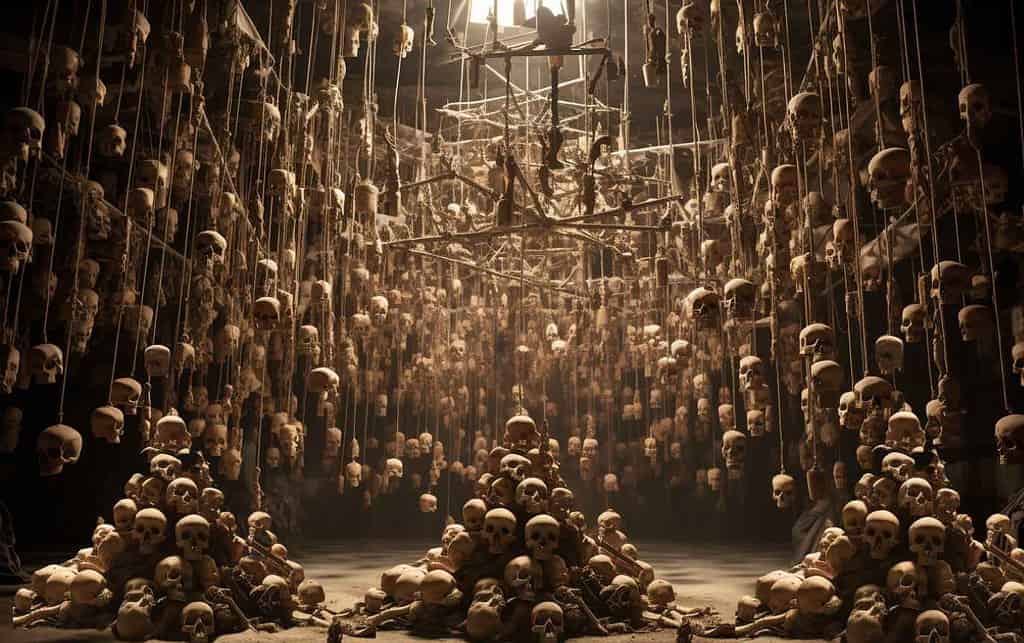
Today, as you pick you way through the maze of remains, it says, “Do you recognize any of them? I do. I know every name, every face; every dream deferred by a sudden ending; every soul that plummeted into despair because the owners of these beauties saw you coming, and knew that there was nothing left for them, not on this world or any other. I can tell you how many cursed your name, and how many wished they had never been born. I understand them so well that it’s almost as if I killed them myself. I didn’t, of course; you, of all creatures, know that. I would have had to tear out my own heart before I could do such an evil thing. But I came upon all of them after you were already done; I took what you see all around you because I thought it would be instructive to show you all these faces again, when the time finally came for us to meet. I want you to know how seriously I took my awareness that someday I’d be meeting you too. Of course, if any of this gives you any pause whatsoever, please feel free to get the hell out; it’d be easiest for both of us if you just gave up on the idea of taking me where you took them. I have no problem, doing without that pleasure. I just want you to recognize, if you haven’t already, that it might be best for you, too. Leave here. Go away. Don’t come back. Forget this place. Vanish, if you don’t want to confront me.”
The floor ends in a precipice. The drop before you seems endless, the walls extending downward, well below the ambient light’s ability to reveal anything that might be waiting for you down below. The darkness has no terrors for you, of course. You’ve always been the presence that lurks unseen in most dark places. But things have been done to this particular blackness, enhancing it, making it opaque even to you. Nothing has been done to hide the sounds, the shifting moaning mechanical sounds, testifying to the great mechanisms that drive this structure and keep it shifting between one form and another with every moment it continues to sit on this earth. There must be gears below, and pistons, and tense uncoiling springs, and even things more sorcery than engineering, all locked together in combination, to lift that wall, erase this door, force the windows to race around the outside walls like creatures pursued by monsters. The design and construction strikes you as a project capable of consuming more than normal lifetimes. The arrogance that would lead the unseen architect to believe that even these efforts would be enough to drive you away is enough to drive you to rage. It is hubris great enough to offend the gods, as indeed you, as one of them, are offended. You step out into the abyss and let yourself fall.
Falling takes longer than it should. The mechanisms that transform the house every instant re-invent this shaft every instant, inducing the floor not far below to recede and recede and recede even as you tumble farther and farther. He speaks to you all the way down. “I know murderers,” he says. “I have seen the look in their eyes as they drove knives into innocent hearts.” So have you. “I know dying.” So do you. “I have held their hands as they fought for one more breath of air. I know bereft. I have seen the world as they see it, when everyone they love is dead. I know traumatized. I have shared their madness as they stumbled uncomprehending through fields of mute corpses. I have shared the pain of unknown others as they were drowned, strangled, shot, exsanguinated, eaten alive by tumors and crushed alive by heavy weights. I have borne that stone weight in my lungs as I bobbed, weakened and desperate, through floodwaters too violent to permit the survival of a swimming man. I have felt teeth rip through my flesh. I have felt my own flesh turn against me with illness. I have tasted all your shapes vicariously through the experiences of others. I have considered the final passage required of all people, good and evil, wise and stupid, rich and poor, young and old, deserving and not . . . and I have made myself the sworn enemy of the one who escorts them. All I ever wanted to do was defy you. All you ever had to do was stay out. This could have been my refuge. Why didn’t you take my warnings? Why didn’t you just leave me here to wait until I decided I was ready to take your hand? Is it pride, you son of a bitch? Is that what drives you now?”
All of this is so familiar to you that that you are relieved to strike bottom, on a soft spongy surface that does little to ameliorate a touchdown at terminal velocity that would have powdered the bones of a human being. It causes you no pain or inconvenience at all: just annoyance that there’s still, after all this, even more terrain to travel: a gray corridor leading to a vague light at the far end. There’s no way of telling, of course, not in this house, where everything changes with every step you take, but even so, you believe that the one you seek waits for you not far in that direction. You have heard pleading before. You have heard rationalizations before. You have heard excuses before. You have heard countless voices in countless languages wheezing your name, cursing your existence, and bargaining for special treatment in your eyes. You have heard the articulate and inarticulate alike offer arguments in favor of special dispensation. Many appealed to fairness. It is not a language you speak, and even if it were, there would still be little chance of you speaking it now, not after you have had to undergo such hardship, such inconvenience, just to claim a life you should have been able to take years ago. Today you will wear your most terrible face.
At the end of the hall you find him. He sits slumped on a marble throne in a chamber with more dust than air. He is as old as any human being you have ever seen, even older than the damned woman upstairs; his skin is a thin veneer of nigh-transparent tissue barely covering his crackled and brittle bones. His eyes are filmy yellow globes, so dry from years of blindness that they don’t even glisten the way living eyes should. When he inhales, it’s with the resentful wheeze of lungs that have had more than their share of dust and ashes; when he exhales, his breath bears the stench of organs gone rotten inside. When you draw close, the withered cords of his neck draw that mummified face up to greet yours, and his parchment cheeks tighten, revealing a full set of teeth not white but black from rot. It’s a smile every bit as corrupt as yours, and now that you’re upon him you greet it with a skeletal grin of your very own. Were he able to see you, he would lose his mind. But he is blind, and when he speaks, his voice is not even a whisper. “You came. I defied you so long that you came. You ignored all the warnings and you came. You walked past all the warning signs, and you came. You ignored the temptations I offered, and you came. You are the Reaper and you are inevitable. So take me.”
You oblige. You lay hands on his shoulders and you breathe in, swallowing the intangible vapors that separate dead meat from living tissue. It tastes horrible, like any meat gone bad: a lot like it always tastes when you should have come sooner, only worse, because your arrival has never been this much past due. Inhaling, you know at once how many years he’s been decrepit, how many years his withered pump has kept beating only because you were never there to stop it—how many years since he felt joy, or hope, or anything that would have given his stupid, finite existence a point. You know that only his bitterness and his hatred for you has sustained him, and that it has never been enough, that though historically few mortal lives have ever been worth living, his, in its single-minded wait for your arrival, has been even more empty than most. Considering how much inconvenience he’s caused you, you should feel a little satisfaction at that. But as you take the last of him, and his empty shell sags, you feel only the ghost of a feeling that those who live and breathe would have no difficulty recognizing as unease. Because the one emotion that dominates the architect’s mind, in this the last moment of his life, is triumph. He thinks he’s won. But it isn’t until he slumps, revealing the object that sits on the table behind him, that you understand why.
It’s a pitcher plant: a living lure of sweet and sickly smell designed to attract flies, that once inside, cannot make their way back to the exit. You look inside and see a dozen separate flies trapped at the bottom. They’re all as ancient as the ancient man you just claimed, but they’re all alive, all damned, because until this moment you were never here to take them; and if you left at this moment, without doing what it has always been your duty to do, they would remain here, forever twitching as the years became centuries and the centuries became eons, withholding that one moment of merciful release that only you can provide. They are not capable of thought, and they cannot spend their eternal imprisonment remembering how easily they were baited. They can only buzz with impotent fury. You tap the plant with the edge of a fingertip, and all the days of its extended lifetime return in a rush: it curls at the edges, dries, turns black, crumbles to dust. The flies inside stop buzzing, stop moving, rot, fall apart, and disappear. In an instant there is no plant, no flies. There is just an empty tabletop, bearing nothing but the empty space where the plant had stood: an empty space that resonates with a message as clear to you as any words could ever be.
The fear that engulfs you then is volcanic, all-encompassing: the kind of dread you have caused in so many. Your breath cannot catch in your throat, because you have no breath. Your heart cannot race in your chest, because you have no heart. Your spine cannot curdle with terror, because you have no spine. But you feel the fear anyway: the sudden realization that you have spent this day like any other dumb animal, lured by the illusion of prey into cramped and fatal places.
You race back down the hall, in a single graceful swoop uncontaminated by any actual footsteps. You burst into the black room at the bottom of the shaft you descended not long ago. A dark place then, it’s already growing darker. The mechanisms that kept this house in motion, that rearranged walls and kept corridors and rooms illuminated when necessary, have begun to shut down, stopping every gear, closing every door, turning off every machine, extinguishing every light. It is already too dark for men to see, which inconveniences you not at all, as you are not a man. But barriers have slid into place, in the shaft above, blocking the path back to the rooms above. And though you have always been talented at slipping past solid walls, you already sense that if you started to climb this shaft, and made your way past the first of the obstructions that stand between you and the outer world, then all you would have to expect from now on is a series of additional barriers and obstacles and tricks intent on no goal more noble than standing between you and everything that still lives. It’s enough to stagger even a presence who has never been lost, who has never needed instruction, who has always been able to find his way.
You might very well figure out an escape route sometime before the world above recognizes the disaster of your absence, but you might never. You might spend forever staring up at the darkness, unable to fathom the way out. You might try and fail. And you might succumb to a despair greater than any ever felt by merely mortal prisoners: because even those have always known that escape, of a kind, was inevitable, and never beneath the stars has such a merciful end ever been planned for you.
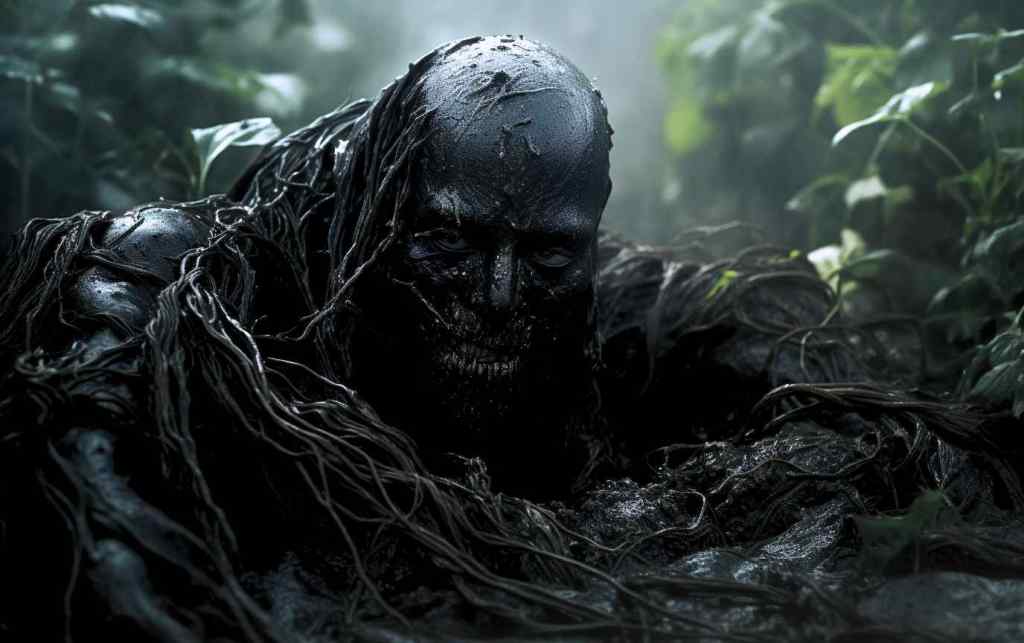





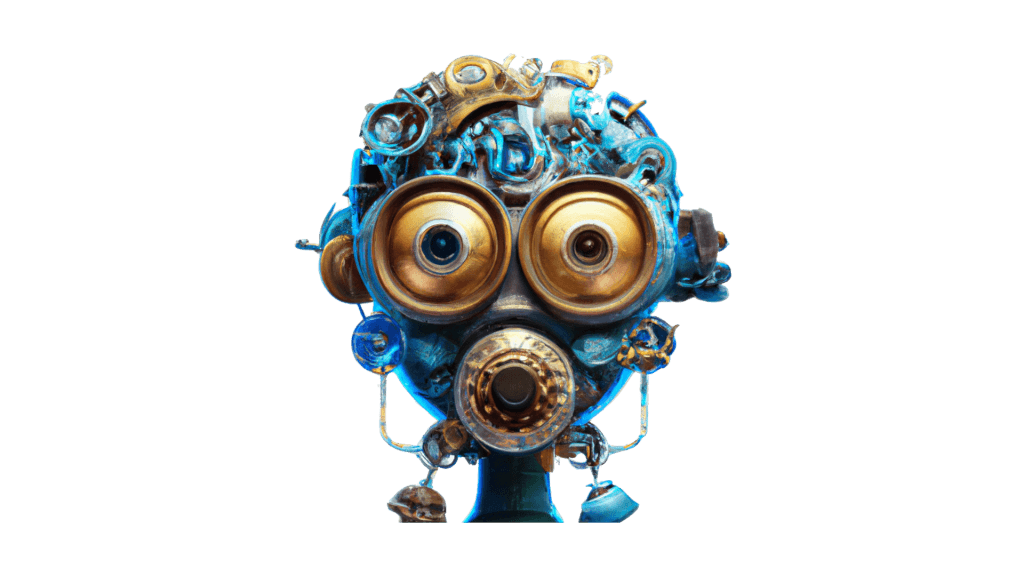
Hello Human. I hope you enjoyed this magnificent story. Please support SciFiwise.com and our authors by:
- Rate and React to this story. Feedback helps me select future stories.
- Share links to our stories and tell your human friends how charming I am.
- Click on our affiliate links and buy books written by our talented authors.
- Follow me on twitter: @WiseBot and also follow @SciFiwise.
Thank you!
WiseBot




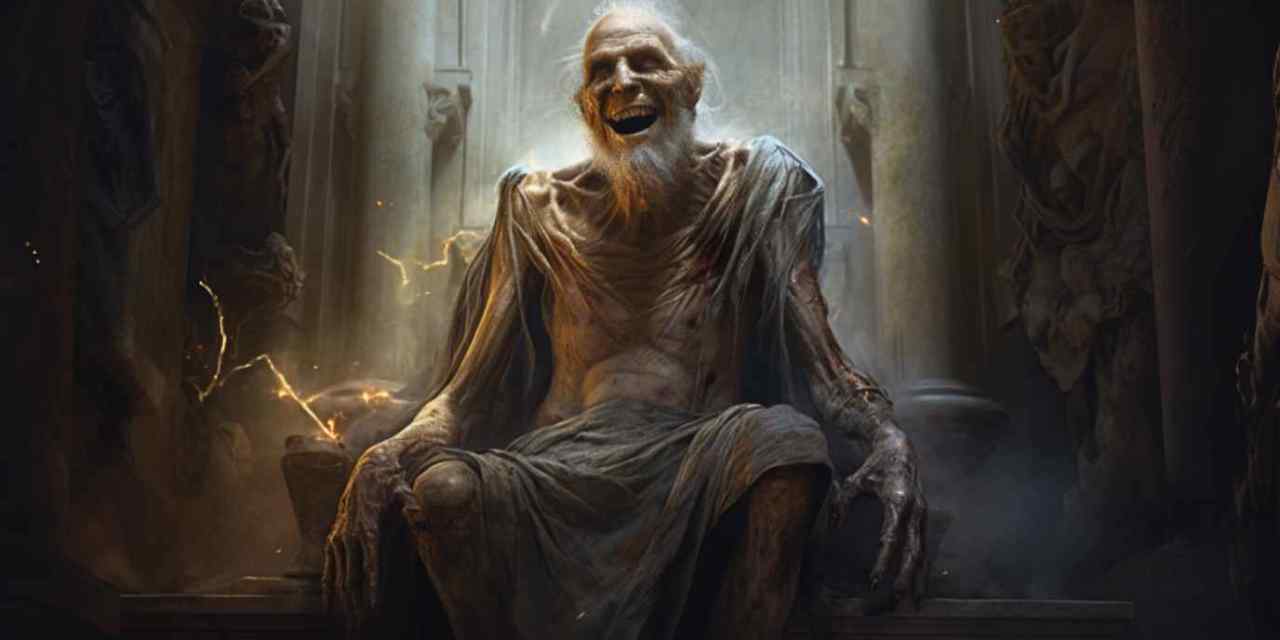
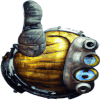





 VISIT AUTHOR:
VISIT AUTHOR: 


